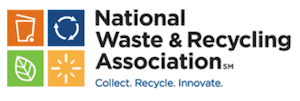Waste and Recycling Industry Groups Produce Poster to Improve Recycling Habits
Arlington, VA – In an effort to help consumers recycle properly, the National Waste & Recycling Association (NWRA), the Solid Waste Association of North America (SWANA), the Northeast Recycling Council (NERC) and the Institute of Scrap Recycling Industries (ISRI) have jointly developed the Think Twice poster.
“The economics of recycling are changing. As our members look to expand markets for their recyclables, it is important consumers understand what items can be recycled and who to contact if they have questions. Our members are educating their customers to improve recycling habits. This poster supports those efforts,” said NWRA President and CEO Darrell Smith.
“SWANA is aware that there are a variety of confusing recycling messages in the United States and Canada, which lead to increased contamination and pose safety threats to workers,” said David Biderman, SWANA CEO and executive director. “This poster, if distributed widely by our members and others, will help improve the quality of recyclables generated at MRFs and reduce the risks to workers involved in recycling collection and processing.”
“Our experiences have shown that education plays a vital role in decreasing contamination and increasing the quality of the recycling stream,” said Robin Wiener, president of the Institute of Scrap Recycling Industries. “The recycling industry is working together to help people better understand common items not accepted in curbside recycling bins. While the rules for residential recycling vary from community to community, there are several common items that cannot be recycled in curbside programs regardless of location. Recycling works and we all have an important part to play.”
“Recycling what should be recycled ‘where’ it is best recycled is important for the safety of the recycling industry and those that work in it. Electronics, batteries and plastic bags should all be recycled, but not in residential recycling programs. Sharps and needles need special handling to protect workers and the public, and food and liquids should be recycled. Of course, diapers need to go in the trash. Following these important basics will improve the value of recyclables as well as make it a safe workplace,” said Lynn Rubinstein, executive director of the Northeast Recycling Council.
###
About NWRA
The National Waste & Recycling Association (NWRA) represents the private sector waste and recycling services industry. Association members conduct business in all 50 states and include companies that manage waste, recycling and medical waste, equipment manufacturers and distributors, and a variety of other service providers. For more information about NWRA, please visit www.wasterecycling.org.
Contact
Brandon Wright
National Waste and Recycling Association
bwright@wasterecycling.org
202-364-3706
About SWANA
The Solid Waste Association of North America (SWANA) is an organization of more than 10,000 public and private sector professionals committed to advancing from solid waste management to resource management through their shared emphasis on education, advocacy and research. For more than 50 years, SWANA has been the leading association in the solid waste management field. SWANA serves industry professionals through technical conferences, certifications, publications and a large offering of technical training courses. For more information, visit SWANA.org.
Contact
Sarah Beidleman
Marketing Coordinator
SWANA
240-494-2238
sbeidleman@swana.org
About ISRI
The Institute of Scrap Recycling Industries, Inc. (ISRI) is the “Voice of the Recycling Industry™.” ISRI represents 1,300 companies in 20 chapters in the U.S. and more than 40 countries that process, broker, and consume scrap commodities, including metals, paper, plastics, glass, rubber, electronics, and textiles. With headquarters in Washington, DC, the Institute provides education, advocacy, safety and compliance training, and promotes public awareness of the vital role recycling plays in the U.S. economy, global trade, the environment and sustainable development. Generating nearly $117 billion annually in U.S. economic activity, the scrap recycling industry provides more than 500 million Americans with good jobs.
Contact
Mark Carpenter
Assistant Vice President of Communications & Marketing
Institute of Scrap Recycling Industries
mcarpenter@isri.org
About NERC
NERC is a non-profit organization that conducts research, projects, training, and outreach on issues associated with source reduction, reuse, recycling, composting, and environmentally preferable purchasing.
Contact
Lynn Rubinstein
Executive Director
Northeast Recycling Council, Inc.
802-254-3636
lynn@nerc.org

